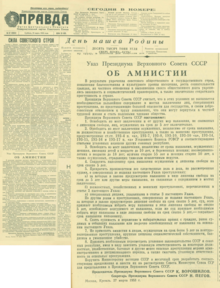You can help expand this article with text translated from the corresponding article in Russian. (January 2023) Click for important translation instructions.
|

The Amnesty of 1953 (Russian: Амнистия 1953 года) was the largest amnesty in the history of the Soviet Union (and in the history of Russia) in terms of the number of the released persons. It was declared by the March 27, 1953 Decree of the Supreme Soviet of the Soviet Union on the Amnesty. Since it was signed by Kliment Voroshilov, it was initially known as the Voroshilov's amnesty. Later it has become known as Beria's amnesty, because it was initiated by March 26, 1953 Lavrenty Beria's draft. Between 1.2 million and 1.35 million persons were freed.
The amnesty was applied to:
- all persons with imprisonment term up to 5 years
- all persons convicted for malfeasance and economic crimes, as well as for some minor military crimes
- all women with children of age up to 10 years, all pregnant women, all children of age up to 18 years
- all men older than 55 and women older than 50
- all persons with grave uncurable diseases
The amnesty was not applied to people with term over 5 years convicted for counter-revolutionary crimes, major theft of socialist property, banditism, and murder. Other acts of the amnesty included the reduction of imprisonment terms, dismissing unfinished criminal proceedings which fit the above criteria, etc.
The amnesty was followed with the considerable rise of criminal activities, therefore it was partially rolled back and many criminal amnestees were imprisoned again.
See also
- The Cold Summer of 1953, a 1988 Soviet crime film with the plot based on the post-amnesty crime rise
References
- ^ Daniel Johnson, Amnesty of 1953: the biggest in Russian history, Global News, February 18, 2020
- Elena Zubkova, Amnesty of 1953 and the first experiments in the revision of social control practices in the USSR, doi:10.31857/S086956870015595-5 (with downloadable pdf file)
- Записка Л.П.Берии в Президиум ЦК КПСС о проведении амнистии. 26 марта 1953 г.
- Земсков В. Н. Заключенные, спецпоселенцы, ссыльнопоселенцы, ссыльные и высланные (Статистико-географический аспект) // История СССР. — 1991. — № 5. — С. 151—165.
- ^ Эли, Марк, Слух о бандитском разгуле в 1953–1954 гг. / М. Эли // Слухи в России XIX-XX веков. Неофициальная коммуникация и "крутые повороты" российской истории : сб. ст. / Юж. – Урал. гос. ун-т, Фак. права и финансов, Центр культ. – ист. исслед., Герман. ист. ин-т в Москве, Челяб. отд-ние Рос. о-ва интеллектуал. истории ; . – Челябинск, 2011. – С. 146–167. – ISBN 978-5-88771-087-7
- Указ Президиума Верховного Совета СССР от 27.03.1953 «Об амнистии»
- Спицын, Е.Ю. Хрущёвская слякоть. — Монография. — Москва: Концептуал, 2020. — С. 32—36. — 592 с. — ISBN 978-5-907172-63-0.